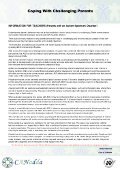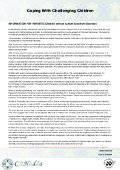Information For Teachers/SENcos
Coping With Challenging Parents
INFORMATION FOR TEACHERS (Parents with an Autism Spectrum Disorder)
Understanding parent’s behaviour may not be that simple but it does’t always have to be challenging. Better communication and a better relationship between parents and staff should be effective.
There could be many reasons for why parents behave and react in a challenging way and they may be unaware of their own behaviours as they themselves could be on the Autistic Spectrum.
The information provided focuses on parents with Autism Spectrum Disorder (ASD) but it can also be helpful to other conditions including ADHD and learning difficulties.
ASD is one of the major neuro-developmental conditions. If a parent has a child with ASD there is a higher chance that one or both parents has ASD too as the condition can be genetically inherited. Asperger’s Syndrome is a hidden disability and is not always obvious initially.
ASD is more common in boys / men but this does not mean that you should discount the possibility in girls / women too. It is less likely to be diagnosed in girls as girls do better socially and cope better with life compared to boys. Girls also don’t normally have the same level of behavioural problems compared to boys.
Autism is a development disorder. Children don’t grow out of it once they enter into adulthood, there is no “cure” and it is a lifelong condition. ASD is not a mental illness but people (whether diagnosed or not) will probably go through life experiencing difficulties as they encounter communication problems, ASD affects how they relate to other people, and also how they see and make sense of the world around them.
People with Autism can be extremely sensitive to specific sensory stimuli. This varies depending on the individual. It is important to think about the senses when talking to the person. Adults with ASD may also have more than one form of Neurodiversity; they can overlap each other which may lead to other difficulties for them.
A person with ASD can easily be overloaded with sensory information in busy places, such as the Reception area, where there are lots of people in close proximity. The way in which this sensory overload is dealt with depends on the individual. It can trigger a fight or flight reaction.
When a situation goes wrong for a person with ASD, it may be confusing for them as they’re trying to make sense of what has happened and where it has gone wrong as they lack understanding of it. It is always helpful to retreat to a quieter area too to talk through the situation with the parent to help them make sense of the situation. Please note that not everyone with ASD may find direct confrontation difficult, so do remember to give them a choice.
Anxiety is a real difficulty for lots of people with ASD. It affects a person psychologically and physically. Anxiety may affect the mind and the body for a person with ASD. It can affect a person’s day to day life, when they are stressed they take less information in as they may not be functioning really well. Their brain just stops working to its full potential.
This can take a lot out of a person; it can be very tiring and draining and can take them two or three days to get back to normal. A person who struggles with anxiety can be affected differently to people who normally work well with understanding and rules.
Some people may experience a meltdown; this can have a big impact on their lives. The person may experience rumbling before a meltdown or a trigger (fight or flight). After a meltdown the person needs space and time to recover as it can take days or weeks to get better. The person that is recovering may find it hard to get out of bed in the morning as they have no energy, they may be withdrawn, want to hide away, lack confidence or be confused.
People that do have a diagnosis, no matter how intelligent they are, can still feel misunderstood and vulnerable. People can find it hard to fit in to society and be accepted – no matter how hard they try they seem to fail. Adults still get situations wrong and make mistakes. Every parent is different and they may well have never received any help or support for the ASD. Only some people with a diagnosis are on medication to help support their ASD.
This document is a guide only, everyone is different, difficulties vary from person to person, these guidelines are here to inform your judgment not replace it.
SOME HELPFUL TIPS
DO keep your language simple and direct, use short sentences and be clear.
DO keep good communication between home and school; breakdown in communication may lead to a parent being more anxious and stressed.
DO explain to the parent and keep them informed so they know what’s going on within school with their child; the parent may not have very good flexible thinking and may find it hard to understand what is going on.
DO make sure parents know what is expected to happen within school; a summary from your SEN policy would be helpful as parents with ASD are highly likely to be visual and may like to see it on paper. They can go through the information in their own time; this will give the parent something to refer back to as they may need to check what’s going to happen throughout the year.
DO make sure information to parents is clear to minimise misunderstanding or misinterpretation. Parents may not be able to read between the lines, be clear e.g. yes or no, left or right, black or white.
DO allow the parents extra time to process information and respond when they are spoken to. If you interrupt them then they may have to start again or become overwhelmed.
DO check for understanding when speaking to the parent; having information written down may be helpful as the parent can take their own time to process the information.
DO be clear of anything that is happening with their son or daughter by keeping them up-dated on what’s going to happen in the future.
DO give them time to outline their concerns as parents may need to make sense of what is happening and going to happen.
DO keep choices simple due to problems with understanding, especially if their anxiety levels are high.
DO remember to let parents know if things change or don’t happen as lack of warning may increase their anxiety levels.
DON’T ignore parents and make them feel unwelcome, they may be having a very difficult day.
DON’T expect them to understand body language, gestures, tone of voice or facial expressions. Be concrete in what you say.
DON’T use abstract ideas and phrases due to the likelihood of literal interpretation.
DON’T take lack of eye contact as a sign of rudeness; it can be hard to process a lot of information as the face has a lot of detailed information or the parent may find eye contact unpleasant.
DON’T think they are deliberately being rude or disrespectful if they talk inappropriately or on seemingly irrelevant topics. This may be likely to increase in times of stress and if an adult brain isn’t functioning normally.
DON’T ignore a parent when things have gone wrong between home and school as they may be very stressed, use calm communication. Allow at least three days for them to calm down and for them to get themselves back to normal. Be aware that there could be other triggers that have or is happening around their lives. Make sure you make an appointment with the parent to help them make sense of their world. Some people with ASD may find direct confrontation difficult, so always try to give them a choice as this may help bring their stress / anxiety levels down.
DON’T get ignored; be patient, be understanding with the parent as they may not be able to help their inappropriate behaviour.
Downloads
 Click to download this page as a poster.
Click to download this page as a poster.
 Coping with challenging children information poster.
Coping with challenging children information poster.
ADDITIONAL INFORMATION
Dystalk
Talks on topics about ADHD, Dyscalculia, Dyslexia, Dyspraxia and Early Years from Professors, Head and SEN Teachers.
Web Site: www.dystalk.com




